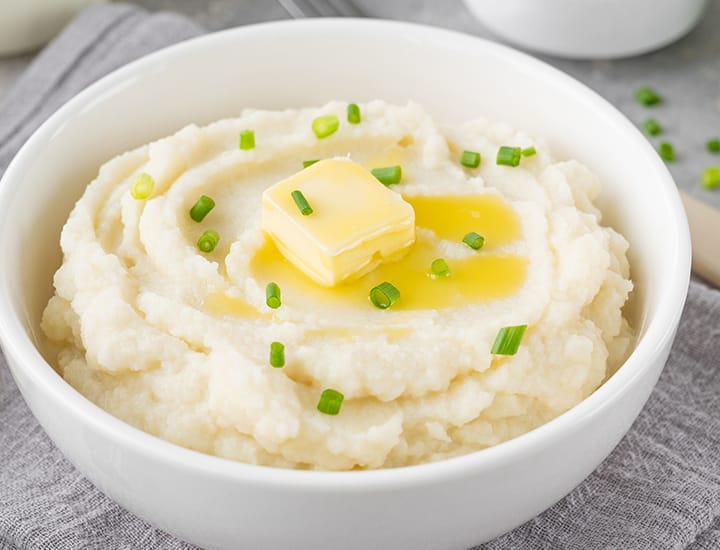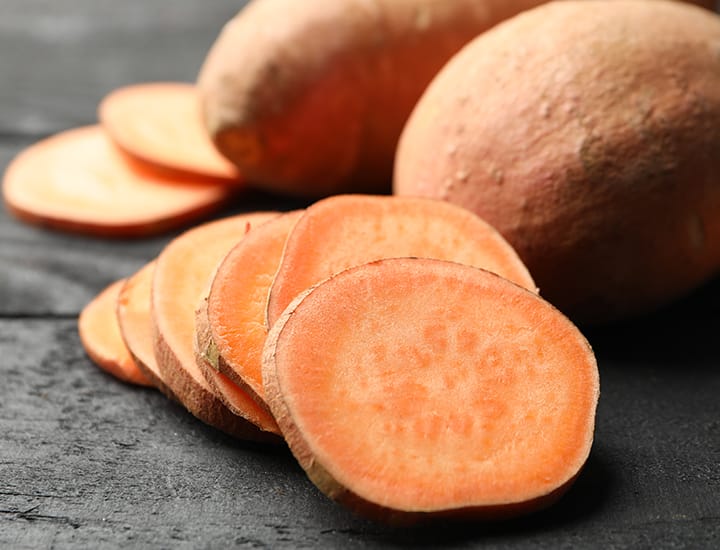The holidays can be a joyous time of year but they can also be a little bit challenging for the health-conscious. Bouncing from holiday parties to family get-togethers, we’re confronted with more unhealthy Christmas recipes at every turn (although there are plenty of weight-loss-friendly Christmas meals!). Resisting these simple holiday pleasures is no easy task. While it can be tempting to just embrace the festivities and savor the season’s Christmas recipes, we have to be cautious of how many times we tell ourselves, “Just one more slice of Christmas ham!”
But why should we be wary of what we eat during the holidays? Research from the World Cancer Research Fund has shown an average Christmas dinner contains as much as 7,000 calories. Given that the recommended daily intake of calories for a woman is 2,000 calories it’s no wonder that we worry about putting on weight during the holidays. And let’s be honest: most of our Christmas dinner plates are filled with side dishes. From roasted pears and sweet potato casserole to crispy brussels sprouts and creamy kale, side dishes make up most of the holiday meal—which is why it’s so important to know which ones to stay away from. You have to be careful with which dinner sides you choose because some end up damaging your health, including your gut health.
Your gut is what’s used to refer to your digestive system. Believe it or not, your gut is the touchstone of your well-being (read about helpful tips to support your gut health!). It can affect everything from your skin to your mental health, and your diet can make or break it. To protect your gut health, there are three holiday side dishes health experts say you should avoid: mashed potatoes, stuffing, and gingerbread cookies.
To discover more about the downsides of these holiday side dishes, we spoke with Joanna Wen, a certified health coach and founder of Spices & Greens. She told us about how these dishes affect your digestive system and healthy holiday side dishes you can make instead. Learn more below!


Mashed potatoes
Everyone loves the simplicity of mashed potatoes. Classic mashed potatoes are easy to make. You just mash boiled or steamed potatoes, usually with added milk (or cream), butter, salt, and pepper. It is generally served as a side dish to meat or vegetables. While they’re filling and a staple of Christmas dinner, mashed potatoes are actually damaging to your gut health in the long run.
This is because mashed potatoes contain copious amounts of starch. Starch is a carbohydrate consisting of sugar or glucose branches. They are indigestible because they are compact, which makes it hard for digestive enzymes to break them down. So because potatoes are high in starch, they can also cause painful gas when eaten in large amounts.
"Many of us enjoy mashed potatoes during the holidays, but this starchy side dish may not be the best choice for gut health. For starters, mashed potatoes (and other refined carbs like white rice and white pasta) have a higher glycemic index compared to healthier alternatives like brown rice and quinoa. This means it can lead to sudden spikes in blood sugar, impacting digestion and breaking down the flora in your gut," Wen says.

Stuffing
Stuffing is probably one of the most popular dishes around the holidays. It’s a savory blend of bread, meats, spices, and a few seasonal vegetables, like celery and onions. Mix it all together and you’ll get a side dish that may even be better than the entree.
But, when it comes to your gut health, stuffing does more harm than good. Unfortunately, some of these ingredients can cause digestive discomfort, such as bloating. "[It’s] often made with white bread, which can be hard to digest and cause bloating. Plus, most traditional recipes contain a lot of fat from butter and oil," Wen says. Who knew?
Not only is stuffing full of starches like white bread, but the onions also cause abdominal discomfort. Onion is a gas-producing vegetable because it contains a natural sugar called fructose which contributes to gas when bacteria in the intestines break it down. Stuffing is all kinds of bad for digestion and it’s even worse when it’s smothered in gravy. This sauce is high in calories and saturated fats which can lead to weight gain.

Gingerbread cookies
When you think of Christmas desserts, gingerbread cookies are probably the first treat that comes to mind. Gingerbread cookies are certainly a holiday staple. And when you cook them, they really make the house smell amazing! Gingerbread is usually made with the following simple ingredients: brown sugar, flour, baking soda, cinnamon, ginger, cloves, salt, butter, milk, and molasses.
While tasty, some of these ingredients are actually detrimental to your gut health. Excess sugar that cannot be broken down and absorbed by the body will be left to sit in the bowels, where it ferments. This sugar then moves more slowly through the large intestine, feeding bad bacteria and yeast, and causing a build-up of gas. This gas can cause cramping, spasms, and pain. Flour has no fiber, it congests the system, slows down digestion which creates a sluggish metabolism, and can often lead to weight gain and constipation. There's a dark side to gingerbread cookies, or at least how some are prepared. We're here to educate you on all the ingredients that are tricky to digest. Happy holidays, y'all!
"Gingerbread cookies are a classic holiday treat, but unfortunately not very friendly to your gut health," Wen notes. "The added sugar in these tasty treats can cause inflammation, bloating, and other digestive issues. The spices and molasses used in the cookies can sometimes be tough on those with sensitive stomachs that may suffer from heartburn or acid reflux." Guess we'll skip gingerbread cookies this holiday season, no matter how tempting they seem.

Healthy holiday side dishes
The holidays are the most wonderful (and filling) time of the year. Even though we believe in indulging during the season, small healthy holiday choices with a focus on gut health can make a big difference. Here are some healthy holiday side dish ideas to replace mashed potatoes, stuffing, and gingerbread cookies.
You can make stuffing healthier by using lean meats and whole grain bread. And, for mashed potatoes, use low-fat milk or Greek yogurt instead of cream. You can even try replacing regular potatoes with sweet potatoes. Not only are sweet potatoes higher in vitamin A, which is crucial for vision, reproduction, and skin health, but they’re also lower on the glycemic index. This means they are less likely than regular potatoes to make your blood sugar spike.
"To make your own healthy gingerbread-style cookie, use honey instead of cane sugar, oats and nuts instead of flour, and coconut oil instead of butter or vegetable shortening," Wen says. "You can also experiment with adding fresh or dried fruits for sweetness and texture. When made this way, gingerbread cookies not only provide pleasant flavors for the holidays–but also digestion-friendly ingredients!"
You can improve your gut health in many ways: by prioritizing probiotics, limiting processed foods, and eating more fiber. Just like every other aspect of your health, your gut health is personal. So if you are struggling with consistent digestive issues, your best option is to speak with your doctor to determine a plan of action for your health demands. But it’s the holidays, so you can let yourself relax. Just be mindful of your gut health and don’t fill up on sides!


























